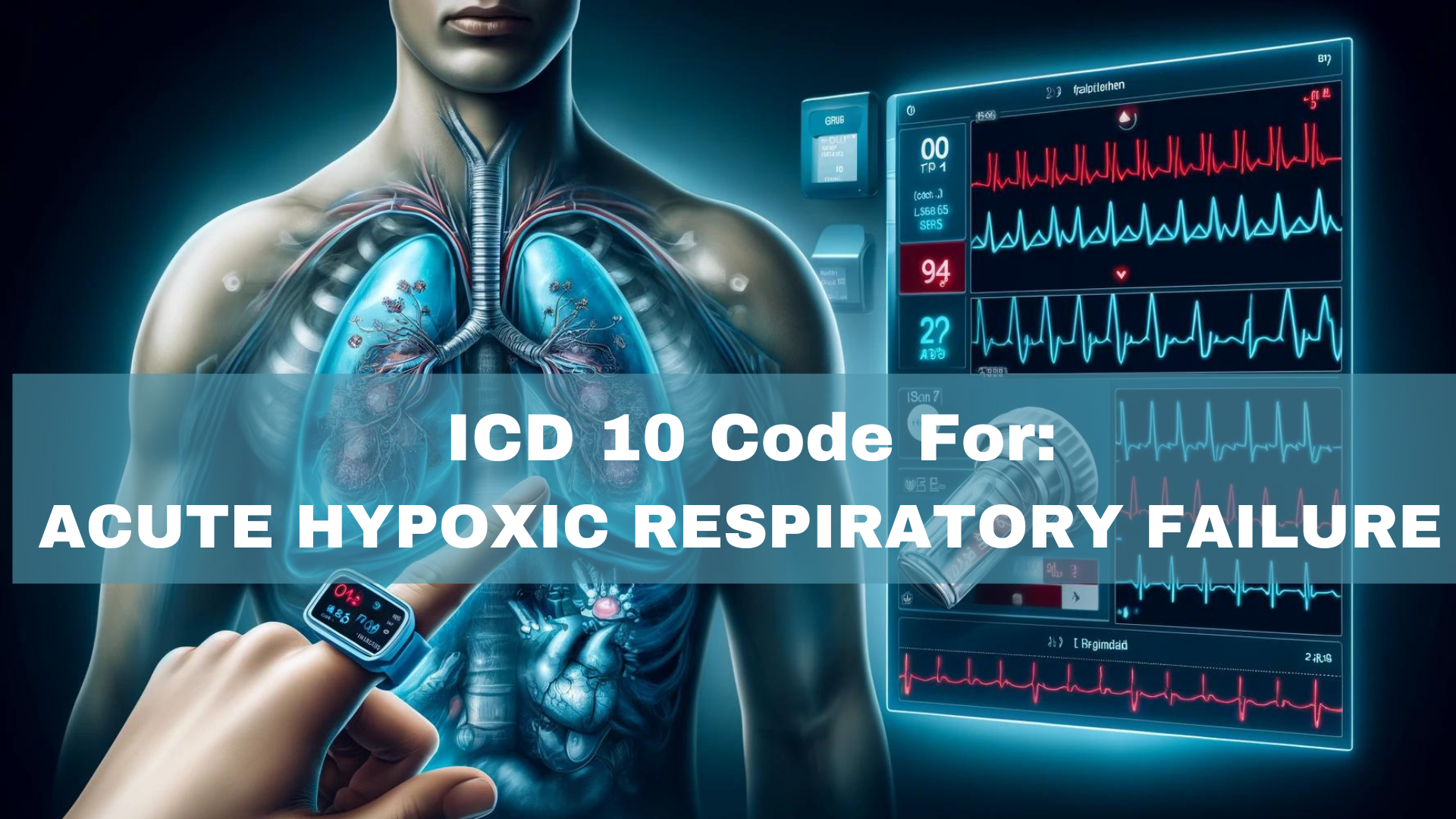Subtotal $0.00
J96.01 is the ICD 10 code for acute respiratory failure with hypoxia. This is the most specific code for acute hypoxic respiratory failure. The World Health Organization manages this coding and updates it annually. The purpose of updating it is to keep the standard of treatment high.
Category of ICD 10 Code J96.01
The Category of this domain is J96 indicates “Diseases of the respiratory system not elsewhere classified”. The code J96.01 specifies certain meanings, including;
- J codes indicate diseases of the respiratory system.
- 96 further specifies respiratory system diseases, with J96 signifying respiratory failure.
- 0 refines the classification to acute respiratory failure.
- 1 indicates the presence of hypoxia
J96.01 signifies a condition where the lungs cannot provide enough oxygen to the body. It results in a medical emergency.
Acute Hypoxic Respiratory Failure ICD 10 Code Description
The description of ICD 10 code J96.01 refers to “Acute respiratory failure with hypoxia.” This code classifies and diagnoses cases where a patient experiences acute respiratory failure characterized by insufficient oxygen levels in the blood. The causes include:
- Diseases affecting the lungs
- Conditions affecting the nerves and muscles that control breathing
- Problems with the spine
- Damage to the tissues and ribs around the lungs
- Drug or alcohol overdose
- Inhalation injuries
ICD-10 Code J96.01 Purpose
The purpose of ICD-10 code J96.01 is to correctly identify, record, treat, and investigate acute hypoxic respiratory failure. It guarantees both the proper payment of healthcare providers and the provision of adequate care for patients. It helps in;
- Diagnosis
- Classification
- Standardization
- Clinical Management
- Billing and Reimbursement
Services Under ICD 10 Code J96.01 (Acute Hypoxic Respiratory Failure)
The J96.01 code itself signifies a medical condition. The services that a patient gets under this code include the following;
- Oxygen Therapy (nasal cannula, oxygen mask, mechanical ventilation)
- Medication Administration (bronchodilators, antibiotics, diuretics)
- Continuous Positive Airway Pressure Therapy
- Bi-Level Positive Airway Pressure Therapy
- Intensive Care Unit Monitoring
- Arterial Blood Gas Analysis
- Endotracheal Intubation
- Mechanical Ventilation
- Pulse Oximetry
- Blood Tests
- Chest X-ray
Acute Respiratory Failure with Hypoxia Diagnosis Code
The diagnosis code for Acute Respiratory Failure with Hypoxia is J96.01. According to the ICD-10 coding system, this specific code indicates the presence of;
- Acute Respiratory Failure: The lungs cannot supply adequate oxygen to the body.
- Hypoxia: Deficient oxygen supply at the tissue level.
Documentation Requirements for Code J96.01
The documentation required for ICD-10 code J96.01 include;
- Clinical Signs and Symptoms
- Diagnostic Tests
- Underlying Cause
- Treatment Type
- Medications Administered
- Response to Treatment
- Time Course of Events
Other ICD 10 Code For Acute and Chronic Respiratory Failure with Hypoixa
The other ICD 10 Codes for respiratory failure include;
Acute Hypoxic or Hypercapnic Respiratory Failure ICD 10
The ICD-10 code J96.00 signifies acute respiratory failure. It doesn’t specify whether the failure is due to hypoxia or hypercapnia. This code is used for unspecified cases.
Acute Respiratory Failure with Hypercapnia
J96.02 code specifically indicates the presence of both hypoxia and hypercapnia. It’s important to note that Acute Hypoxic Hypercapnic Respiratory Failure often presents with both conditions.
ICD 10 Code For Acute Hypoxic Respiratory Failure
J96.20 is the ICD 10-CM Code for Acute/chronic respiratory failure, whether hypoxia or hypercapnia, unspecified. The separate codes for acute and chronic respiratory failures, hypoxia, and hypercapnia are also present. These codes ensure better and more accurate results and treatments. The coding helps to specify certain conditions.
| Code | Description |
| J96 | Respiratory failure |
| J96.0 | Acute respiratory failure |
| J96.00 | Acute respiratory failure, unspecified whether with hypoxia or hypercapnia |
| J96.01 | Acute respiratory failure with hypoxia |
| J96.02 | Acute respiratory failure with hypercapnia |
| J96.1 | Chronic respiratory failure |
| J96.10 | Chronic respiratory failure, unspecified whether with hypoxia or hypercapnia |
| J96.11 | Chronic respiratory failure with hypoxia |
| J96.12 | Chronic respiratory failure with hypercapnia |
| J96.2 | Acute and chronic respiratory failure |
| J96.20 | Acute/chronic respiratory failure, unspecified whether hypoxia or hypercapnia |
| J96.21 | Acute and chronic respiratory failure with hypoxemia |
| J96.22 | Acute and chronic respiratory failure with hypercapnia |
| J96.9 | Respiratory failure, unspecified |
| J96.91 | Respiratory failure, unspecified with hypoxia |
| J96.92 | Respiratory failure, unspecified with hypercapnia |
Some Relevant Coding for Respiratory Failure:
- Acute respiratory distress syndrome (J80)
- Cardiorespiratory failure (R09.2)
- Newborn respiratory distress syndrome (P22.0)
- Post procedural respiratory failure (J95.82-)
- Respiratory arrest (R09.2)
- Respiratory arrest of newborn (P28.81)
- Respiratory failure of a newborn (P28.5)
Conclusion
Prompt medical attention is necessary for Acute Hypoxic Respiratory Failure (ICD-10 Code: J96.01). The body, or a specific organ or tissue, does not get enough oxygen, which results in respiratory failure. Organ failure and death may happen in such circumstances. Correct coding by medical billers and healthcare providers is necessary to guarantee proper reimbursement and data tracking. It also helps to distinguish this disease from other respiratory failures when the right code, J96.01, is assigned, ensuring that patients receive the appropriate care and treatment. Healthcare workers can enhance patient outcomes and resource allocation by becoming more proficient in ICD-10 coding and increasing the efficiency of their coding procedures.






